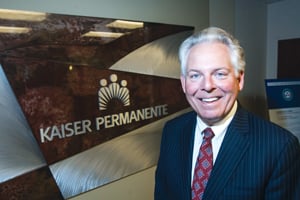
Pasadena native William Caswell, 59, oversees more than 55,000 employees and a $23 billion budget as senior vice president of operations for Kaiser Permanente’s Southern California region. Now he’s assuming yet another responsibility: He took over as board chairman of the Los Angeles Area Chamber of Commerce late last month.
He now leads an organization that has found itself on the defense against the powerful local labor lobby. At labor’s behest, Los Angeles Mayor Eric Garcetti has proposed raising the minimum wage in the city to $13.25 an hour by 2017 and several council members want to go even further, to $15.25 an hour by 2019. In addition, the city is moving at a glacial pace in addressing one of the business community’s top concerns: the costly business gross receipts tax.
Caswell spoke with the Business Journal about those issues from Kaiser Permanente’s regional offices in Pasadena.
Question: What are your main goals as 2015 board chair of the Los Angeles Area Chamber of Commerce?
Answer: First and foremost, building on a business-friendly agenda that puts job creation as the No. 1 priority. We have to build on the companies that are here today and also make the region an attractive destination for new companies. Also, continuing the focus on building the good work around K-12 education and on transportation in the public and private sectors. What I want to bring as a leader is to create forums where we can be in alignment with key stakeholders, whether they be elected officials or disparate interest groups. And that includes finding a path with labor.
There’s a strong sentiment among many local business owners that the chamber has lost its clout at L.A. City Hall and that labor now dominates the agenda. They want to see the chamber take a much stronger stand against labor, not “find a path” with labor, as you put it.
I see it slightly differently. I see that the chamber’s voice today is as strong or stronger than at any point in its recent history. That’s because of the coming together of business leaders in key industries in a focused and thoughtful approach. Look, everyone is committed to job creation – that includes businesses and labor. If we continue to view that as our North Star, there are ways we can achieve progress on many goals that we as a chamber have set out.
So, under your board leadership, is the chamber going to take a more aggressive stance against labor or try to find accommodation with labor?
The key here is whether the chamber is able to balance the strength of labor in an effective way. On the minimum-wage issue, the focus right now is on getting the right information in reputable and balanced studies on which to base the policy discussion. Then, if there is going to be change, we can look at setting a path and a timeline on the minimum-wage issue that is acceptable to business. There is a desire among every business to establish a fair and living wage.
Sure, every business may have that desire to pay fair wages and benefits to their employees. But most business owners we talk to don’t want the government – especially local government – telling them what that wage should be.
Look, we’re opposed to an L.A.-specific minimum wage. We support a broader wage policy that includes the voices of all our constituent cities.
What about the glacial pace of business tax reform? The Los Angeles City Council just voted to lower the top rates a bit, but they are still much more costly than surrounding cities. Shouldn’t the gross receipts tax be eliminated and the sooner the better?
This is a topic at the top of the chamber’s priority list. The proposal that the council has worked on is very encouraging and is a great start. Given that, we must understand the implications of whatever proposal is advanced and how those funds would be replaced. There is still a need to fund city services.
So you don’t buy the argument that if the city just eliminates the business tax that so many businesses would expand and locate here that their other taxes and fees would more than make up for the $400 million in revenues that the business tax has brought in?
I think that’s where the discussions get more focused. Sure, there may be a scenario where those revenues do come in. But what’s the contingency strategy if that supply-side scenario does not pan out and the revenues don’t come in?
If there is one hallmark that I value in others and that I aspire to in myself, it’s common sense. There’s a need to move forward, but understanding the implications and consequences, that’s what leadership is all about.
What do you do when you are not working on Kaiser or chamber business?
I love traveling with my family. We just got back from a two-week trip hiking in New Zealand. And I’ve been a season ticket holder of the Los Angeles Dodgers for more than 30 years now.
